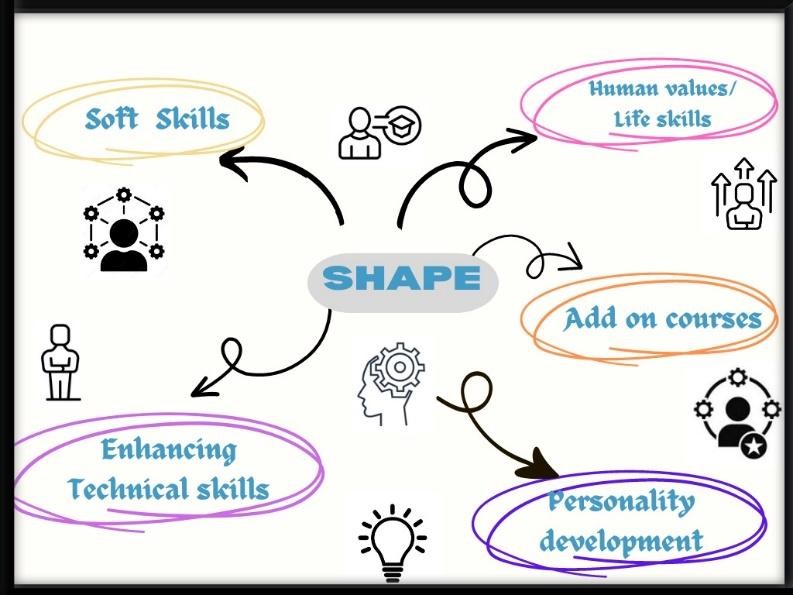Professional and Technical Quality Enhancement Using the SHAPE Model
Shree Devi Institute of Technology (SDIT) is deeply committed to providing quality education to all its students. To fulfill this commitment, the institute has implemented the SHAPE Model, a structured framework aimed at enhancing the professional and technical quality of the students. This model focuses on developing soft skills, human values, add-on courses, personality development, and technical skills, ensuring students excel academically and professionally while fostering a culture of continuous improvement and excellence.
Aims of the SHAPE Model
- Holistic Development: Emphasizes the importance of soft skills, human values, add-on courses, personality development and technical skills.
- Competency Building: Equips students with the necessary skills for academic and career success.
- Culture of Excellence: Fosters continuous improvement and a culture of excellence from induction till the last day of college.

Components of the SHAPE Model
- S – Soft Skills: Soft skills are crucial for professional success, complementing technical expertise. SDIT integrates soft skills training into the curriculum to help students develop essential communication, teamwork, problem-solving and leadership skills. These competencies are vital for their overall development and effectiveness in the workplace. Students engage in activities such as group discussions, role-plays, and public speaking exercises to build their confidence and communication abilities.
- H – Human Values/Life Skills: Instilling human values such as integrity, empathy, respect and responsibility are vital for fostering ethical behavior, social responsibility and a positive work culture. SDIT incorporates group discussions, case studies and activities that promote ethical decision-making, helping students become well-rounded professionals with a strong moral compass. Programs on life skills also include stress management, time management, physical & mental fitness, health and nutrition, yoga and meditation to prepare students for real-world challenges.
- A – Add-on Courses: Offering add-on courses or supplementary training programs provides students with additional technical skills, certifications or specialized knowledge beyond their core curriculum. These courses are tailored to industry demands, emerging technologies, or niche areas of interest, ensuring students remain competitive and adaptable in the job market. Popular add-on courses include data science, cybersecurity and advanced software development.
- P – Personality Development: Personality development programs enhance students’ self-awareness, confidence, emotional intelligence and professional growth. Through workshops, coaching sessions and experiential learning activities, students cultivate a positive self-image, develop effective interpersonal skills and build resilience to navigate challenges in their personal and professional lives. Activities like mock interviews and leadership development programs are integral parts of personality development at SDIT.
- E – Enhancing Technical Skills: Actively engaging students in honing their technical skills is fundamental to their success in technology fields. This involves hands-on projects, internships, industry collaborations and participation in technical competitions or hackathons. By providing practical experiences and real-world exposure, students can apply theoretical knowledge, gain practical insights and develop a portfolio of accomplishments to showcase their abilities. The institution also facilitates industry visits and guest lectures from professionals to bridge the gap between academic learning and industry requirements.
Implementation Across Four Years of Study
Second Year:
- Personality Development: A ten-hour program on conversation, listening, debating skills and more through activities like toggle talk and situation analysis. Students are encouraged to participate in activities for self-reflection.
- Soft Skills Program: A 36-hour program covering goal setting, time management, grooming, stress management, leadership, creativity, and innovation.
- Technical Training Certificate (TTC): IT branches receive core subject training over 10 weeks by internal faculty, while non-IT branches undergo core subject training.
Third Year:
- Aptitude Training: Training in algebra, time, speed, distance, verbal reasoning, data interpretation, etc., with in-class exercises and facilitator support to enhance problem-solving techniques.
- Communication Class: Focuses formal and informal communication classes, active listening, verbal and nonverbal communication, business emails, and presentation skills.
- Soft Skills: Focus on conveying technical information clearly, developing teamwork, critical thinking, problem-solving and time management.
- TTC: Provides specialized technical training in advanced concepts.
Fourth Year:
- Specialized Aptitude Classes: Focus on mathematical concepts and problem-solving techniques.
- Technical Training Sessions: Enhance technical skills and knowledge.
- Soft Skills Integration: Continue soft skills development.
- Aptitude and Technical Tests: Assess proficiency and job readiness.
- Continued Soft Skills Training: Prepare for professional challenges and interactions.
Outcomes of the SHAPE Model
The comprehensive approach of the SHAPE Model has resulted in a high employability rate among SDIT students. Many students secured placements in the academic years 2018-19 and 2019-20, demonstrating the model’s effectiveness. This success highlights SDIT’s commitment to producing capable, ethical and employable graduates who are prepared to make meaningful contributions to their industries and communities.
By mastering both the technical aspects of their field and developing practical skills and knowledge, SDIT students are well-prepared for the workforce. Improved academic performance reflects their ability to apply learned concepts effectively, while increased employability indicates that employers recognize their proficiency and readiness.
Ultimately, the success of SDIT can be measured by the positive impact of its graduates on society and the workforce. Equipping graduates with the necessary skills, values, and mindset ensures they are not only capable professionals but also responsible citizens who actively contribute to the betterment of their communities and industries.
The SHAPE Model has proven to be a robust framework for enhancing the professional and technical quality of students at SDIT. By focusing on a well-rounded education that includes soft skills, human values, additional technical training, personality development, and technical skill enhancement, SDIT has successfully achieved a commendable placement rate. This model exemplifies the Institute’s dedication to excellence and its mission to empower students to achieve their fullest potential.
Students are encouraged to participate in research projects, entrepreneurship cells, and innovation hubs, which further enhance their problem-solving abilities and prepare them for future challenges. The emphasis on continuous learning and adaptability ensures that SDIT graduates are not just job-ready but are also equipped to be leaders and innovators in their respective fields. The model’s success is a testament to the institute’s forward-thinking approach and its unwavering commitment to student development.
